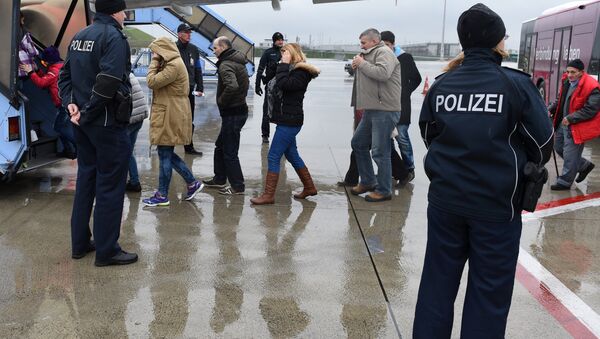The reported plans of the south German state to turn a hangar of the bankrupt airline Air Berlin, bought out by the local giant Lufthansa, at the Munich Airport into a detention center for rejected asylum seekers, have triggered debates on social media. Some supported the move.
Das wäre eine super idee!
— christina u. Stephan❌ (@u_boehm) 4 августа 2018 г.
Das beste wäre den ganzen Flughafen als Abschiebeknast zu machen bei den zwei Millionen illegalen hier im Land nach Artikel 16a.
It would be a super idea! It would be even better to turn the whole airport into a refugee prison with 2 million illegal migrants here with Article 16a.
Ich melde mich freiwillig als abschiebehelfer
— Adonis (@Adonis49069909) 4 августа 2018 г.
I volunteer to assist the deportation service.
Hoffentlich bald
— rebound54 (@rebound541) 3 августа 2018 г.
I hope, soon
Others criticized the idea.
Deutschland nimmt in diesem Hangar Italien-Asylis auf, um damit Italien zu entlasten…..welch Irrsinn….
— Jim Panse (@Jim1panse) 5 августа 2018 г.
Germany detains in these hangar refugees registered in Italy in order to unburden Italy. What a nonsense…
Besides potential deportees, Bavaria hopes to keep migrants who applied for asylum in other EU countries there before they are sent back, as the outlet Spiegel reported. The German media points out that the country’s constitution calls for a person to be detained until the end of the day after they are captured. However, police reportedly doubt that this is sufficient to confirm the identity of a detainee, take him or her to Munich Airport, find out if it’s possible to send the person back to another EU state, and book a flight there if it’s needed.
The outlet cites the Bavarian State Interior Ministry as saying that the "necessary concept principals" for implementing new asylum regulations, proposed earlier this year in Germany, are "not yet worked-out."
'Arrival, Decision, Return'
Germany began opening "Anker" migrant processing centers, the acronym name is based on the three German words Ankunft, Entscheidung, Ruckfuhrung (arrival, decision, return), on the border with Austria this August. The first one opened its doors in the southern federal state of Bavaria.
The decision to set up anchor centers was the result of a compromise reached between German Chancellor Angela Merkel and Horst Seehofer, the interior minister and leader of the Christian Social Union (CSU) party. The deal was clinched amid Seehofer’s threats to resign unless the government accepted his proposal to pursue tougher migration policy and turn away migrants who have already been registered as asylum seekers in other EU countries or denied asylum.
READ MORE: Germany's Interior Minister Presents Hard-Line Master Plan for Migration
Proponents of the measure note that Anker centers will house all relevant government agencies, so the entire asylum process could be expedited, in a "one stop" approach. Instead of distributing asylum seekers across municipalities, up to 1,500 people will be held in each of the centers.
However, critics were prompt to counter that it will be mostly centers that take migrants in. Notably, inhabitants of such centers will keep the right to appeal. Meanwhile, decisions in the past show that some 40 percent of migrants ordered out of the country by immigration authorities, were later granted asylum in court.
In contrast to Bavaria, several German states have either refused or postponed the decision to host such centers, so as to wait and see how it will work.


